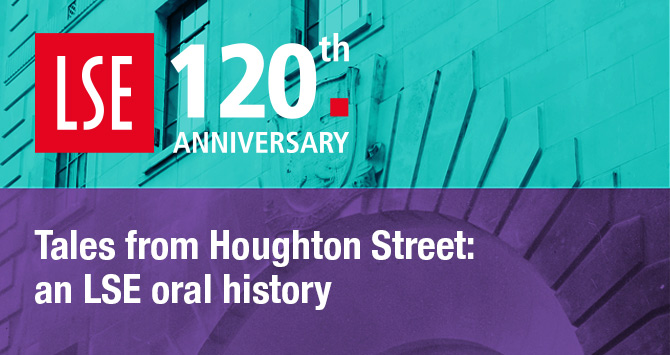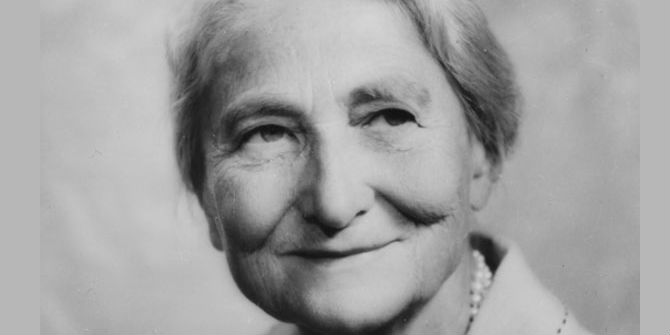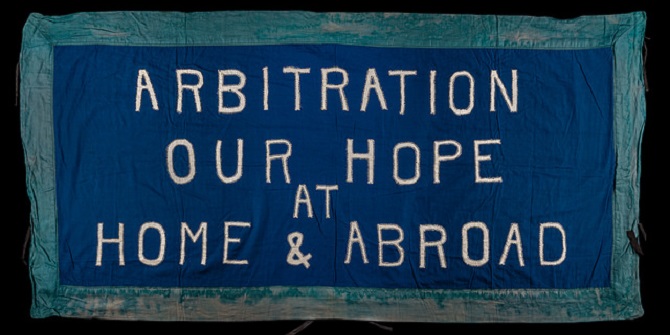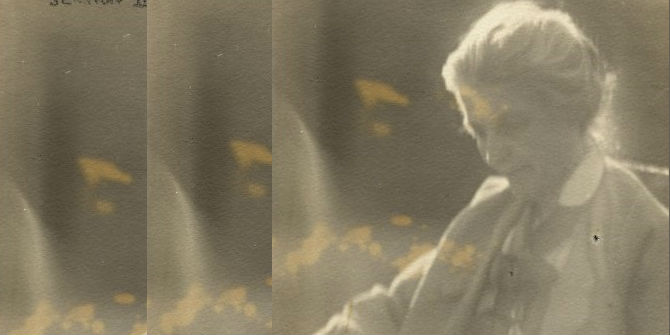Clara Cook shares her experience making an LSE oral history. The Tales from Houghton Street podcast and collection are now available at LSE’s Digital Library.
The first recording I ever made of someone’s voice was when I was two years old. I held out a tape recorder to my mother and asked her to say the words “peanut butter”. Since then I have been recording sounds, such as birdsong, footsteps in a corridor or waves on a beach, for 30 years. But the sound I most love to record is that of a person’s story. I have practiced on my friends and family repeatedly, plaguing them with questions and pestering them with requests for reminiscences. It is only in the last few years that I came to realise that what I was so interested in was actually the field of “oral history”.
In 2015 I became involved with my first official oral history project, the Lottery Heritage Funded “These Dangerous Women” project, organised jointly between The Women’s International League for Peace and Freedom (WILPF) and The Clapham Film Unit. As well as acting in a documentary and completing archival research, I received my first ever course in oral history training and I was immediately hooked. Oral history is different from many other types of history in that it is very subjective, not always factually accurate or even chronological. It is the history of people, often ordinary people and their memories and feelings. Oral history can be used to explore the individuals within an institution or company and surrounding a historical event or time period or place, giving a more personal approach to what might be written in history books.
It was with this view that I turned to my current workplace at LSE and found that in the year of its 120th anniversary there were a great deal of events and online information such as this History blog but not a commemorative oral history project of the School. I approached Hayley Reed, LSE’s Marketing Project Manager, with the idea of an oral history project. She recruited Sue Donnelly, LSE’s Archivist, whose extensive knowledge of the history of LSE was key in helping us choose who to interview, and Tom Sturdy, a film and audio producer.
The pool of interviewees was made up of alumni, faculty and staff, many of whom had worked at the School for years and had been witness to the changes on campus. Negotiating when and how to interview people was time consuming but not difficult. However using the recording equipment and finding a place on campus to record, was very challenging. LSE is very noisy and being in Central London means that there is a great deal of noise pollution. I usually prefer to interview someone in their own home surrounded by sound insulating soft furnishings such as sofas and cushions! You would be surprised how much background noise our brains ignore every day until you hear it in a recorded interview.
I also got to test my oral history training skills by writing a best practice guide to oral history for the other volunteers in the project and this allowed me to think carefully about the questions I was going to ask and how I was going to phrase them to different individuals. Oral history is all about getting the most detailed, best possible recollections from people that you can, so you have to think carefully about what questions you ask. This was extremely easy with alumni. They loved talking about the School and everyone had interesting and colourful memories of their time at LSE, from where they ate on campus to which lecturer inspired them the most. The task proved slightly problematic with LSE staff. It is hard for people to be so candid about an institution or to be free when describing their feelings when they are still employed at the particular place being discussed. Some of the faculty were used to being interviewed by journalists and so their answers were succinct and brief, very useful in a media interview but not necessarily in an oral history recording.
To encourage people to explore their memories and to bring them out of themselves while putting them at ease while being recorded is often quite difficult. Oral history really taught me how to listen and to have patience. I could not interrupt a person’s story and I had to carefully follow what they were telling me. Conducting an oral history interview is not a two way dialogue, the interviewer should rarely be heard on a recording and so I had to listen intently while also thinking of the next question and keeping my normal instinct to respond verbally quiet. I needed to recognise when someone needed a break and when they said they didn’t want to talk about something but slowly worked their way around to talking about it anyway because they really did want to tell their story and for someone to listen.
Because it is so personal and can often collect a lot of private data, oral history raises many moral and ethical questions, such as, how do you conduct an interview? How do you encourage someone to tell their subjective and possibly distressing story? How long do you keep a recording? What do you use the recording for? Can it be released publicly? I began to realise that very few of my other hobbies required me to be so ethical, sensitive, thoughtful or silent!
I learned about LSE through this project and felt proud of the School’s heritage and achievements through the interviews I conducted. This Spring I am embarking on another oral history project, this time interviewing residents in Brixton about the changing nature of the area and their housing. I would urge anyone who is interested in the history of ordinary people, their family, their colleagues, to get involved with oral history, you can even record interviews using an app on your smartphone. In life we are plagued by distractions and interruptions and I truly believe that in a world of so much noise, it is important to take the time to listen carefully to someone’s story.






